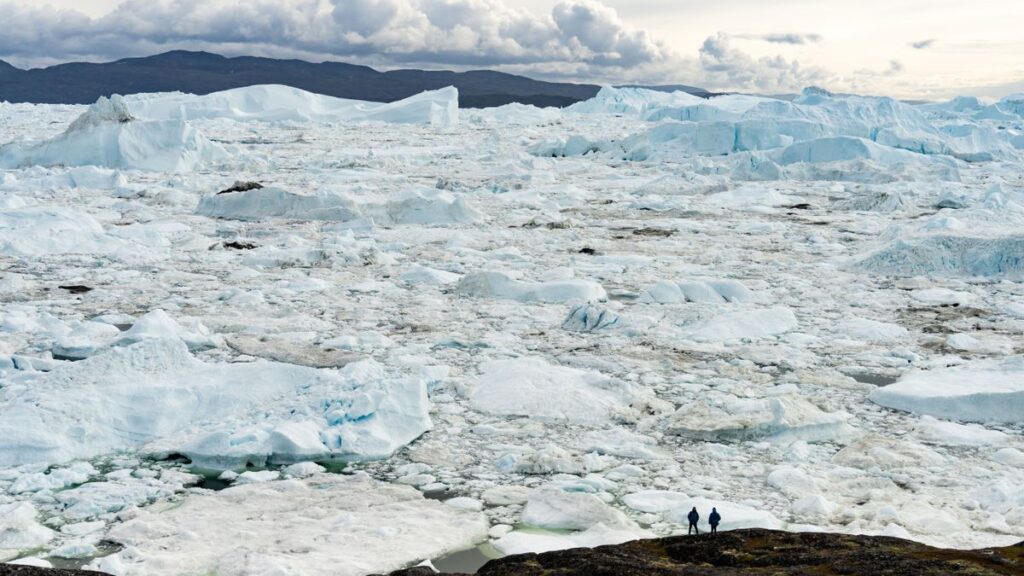The future of the Gulf Stream could hinge on a “tug-of-war” between two distinct types of melting occurring on the Greenland Ice Sheet, according to a recently published study. The research conducted during the last ice age, ranging from 16,800 to 60,000 years ago, shows that fleets of icebergs breaking off from the coast of North America led to significant weakening of vital ocean currents.
Modern-Day Iceberg Calving
The study, published on May 30 in the journal Science, found that current iceberg calving rates from the Greenland Ice Sheet match those of some past events. However, runoff from Greenland’s coasts could prevent such disruption. “We’re primarily worried about the tug-of-war between the more effective yet decelerating ice discharge and less effective accelerating runoff,” reports lead researcher Yuxin Zhou, a postdoctoral scientist at the University of California, Santa Barbara.
Current Concerns
The Atlantic Meridional Overturning Circulation (AMOC), which includes the Gulf Stream, regulates the climate by transporting nutrients, oxygen, and heat from tropical waters to the north and cold water south. The AMOC can exist in two stable states: a stronger, faster one that we rely on today, and another that is much slower and weaker. Climate change is disrupting this flow by causing freshwater from Greenland’s melting ice sheet to make the water less dense and less salty. This has led to an increasing number of studies suggesting that the current is slowing and could be veering toward collapse.
Icebergs breaking off from the Laurentide Ice Sheet, which dominated North America during the last Ice Age, are known as Heinrich events. The present-day cause of this melt is climate change. During the last glacial maximum, a combination of ocean heating and the accumulation of ice on the sheet likely caused the melting. This led to icebergs sliding into the sea and freshwater cascading from the shelf, both of which weakened the AMOC significantly over a few hundred years.
Comparing Past and Present
To determine if present-day iceberg calving from Greenland could trigger an AMOC collapse, Zhou and his team studied sediment layers deposited by past Heinrich events. The researchers used thorium-230, a form of the radioactive element found in seawater and diluted by fresh meltwater from icebergs, to compare their findings with predicted ice outflow from Greenland. The researchers established that the modern-day climate change impact, traced since the Industrial Revolution, is comparable to a mid-range Heinrich event.
However, there are crucial differences between the ice age and now. The AMOC had already started slowing down before the icebergs began to calve during the last ice age. In contrast, despite showing more variability than previously thought, the AMOC is currently in a “pretty healthy state” without significant slowdown, Zhou said.
AMOC’s Future Depends on Tug-of-War
According to Zhou, the changes we’re seeing today are governed by the relationship between iceberg calving and freshwater melt directly from the shelf. Icebergs play the most significant role in this slowdown, with runoff playing a secondary role. While runoff does cause some slowdown, it also hinders iceberg production, creating the tug-of-war that will decide the future of the AMOC.
However, if the AMOC is considered to be starting from a stronger position today than it did in ancient times, there may be a cause for cautious optimism, Zhou notes. But the inclusion of other influences from ocean and Arctic warming in future studies could alter this perception.
There are still many factors we need to understand for more accurate predictions of future AMOC behavior, warns David Thornalley, a professor of ocean and climate science at University College London. “But there are enough reasons to be concerned about the AMOC, and we should apply the precautionary principle — we really don’t want to experience first-hand the climate impacts of an AMOC collapse. It’s one of many climate impacts we should do all we can to avoid.”
Original Story at www.livescience.com
